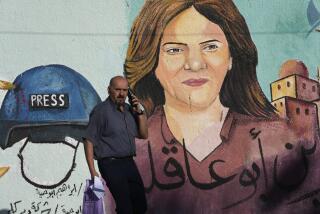Jordanian journalist shot to death on courthouse steps after posting controversial cartoon to Facebook
Reporting from Beirut — It was Sunday morning, the start of the work week after the long Eid al-Adha holiday, when residents of the Jordanian capital, Amman, woke to reports of the killing of Nahedh Hattar.
A journalist and commentator, Hattar was long known for his controversial secularist views and vocal support of Syrian President Bashar Assad.
The killing made Hattar, 56, the most recent casualty in a country-wide duel between Islamists and secularists, clashes that threatens to rock the stability of the perennially fragile kingdom, which has been a key U.S. ally in the region.
Hattar, according to local media outlets, was killed on the steps of Amman’s main courthouse, where he was set to go on trial on charges of inciting strife and insulting Islam.
Weeks earlier, he had enraged Muslims across the country by posting a cartoon, “The God of Daesh,” on his Facebook page.
Daesh is the Arabic acronym of Islamic State, and is considered pejorative by the group’s adherents.
The cartoon depicted a bearded man, presumably an Islamic State militant, lying in bed with two women while asking God to bring him wine and cashews. The man also asks God to have someone clean up the mess, install a door for his tent and to knock before entering in the future.
In Islam, those who die in combat in the name of God are rewarded with Hoor, beautiful women with lustrous eyes, and can enjoy rivers of wine. The cartoon portrayed the militant as taking that to ridiculous extremes, and also broke a taboo by portraying God.
In the ensuing backlash, some conservative Muslims called for his execution. Hattar quickly took the cartoon down, saying that he was merely “mocking the terrorists and their depiction of God and heaven.”
But he was soon arrested. The government said it had imprisoned him for his own protection, but Prime Minister Hani Mulki also said he would not allow the crossing of red lines when it came to holy issues and would deal “firmly” with the incident. The government also issued a gag order, a tactic it has frequently used in the last year in what critics say is a method of stifling necessary debate.
Hattar was released on bail earlier this month and was to appear in court on Sunday.
As he arrived, a gunman walked up to him and shot him three times, according to Petra, the state news agency. Security officials nearby quickly arrested the attacker, the agency said.
Government spokesman Mohammad Momani condemned Hattar’s killing as an “ugly crime,” adding that the “law will be firmly applied to the perpetrator,” according to Petra.
Momani added: “The government will respond with an iron fist against anyone who tries to use this crime to spread hate rhetoric in our society.”
Video taken by a bystander and posted on social media depicts the aftermath of the shooting. It shows Hattar lying on the ground, ringed by security officials while people shout frantically for an ambulance.
The killing comes at a contentious time in the country, which, although stable, has long been thought to be a tinderbox of extremism.
A significant portion of its citizens have snuck into neighboring Syria, to take up command positions in the Al Qaeda-affiliated Front for the Conquest of Syria (formerly called Al Nusra Front) and its one-time ally turned nemesis, Islamic State. Jordan’s population, overwhelmingly Sunni Muslim, is deeply conservative.
In June, the U.S. State Department’s Bureau of Counterterrorism and Countering Violent Extremism released a report saying that, although Jordan had “sought to confront and weaken the violent idea that underpins [Islamic State] and other violent extremist organizations,” anti-extremist programs remain “under-resourced and staffed,” and that its leaders “are reticent to acknowledge domestic radicalization, including self-radicalization.”
In years past, the government has toughened its anti-terrorism laws, hauling in hundreds of Jordanians for the slightest connection to Islamic State, including spreading or liking its propaganda on social media.
Yet its critics accuse it of turning a blind eye to extremism and allowing Islamists to take over vital government ministries, including the Ministry of Education.
Hattar’s family also blamed the government for his death, saying it had informed the Ministry of Interior of the death threats and that the government had done nothing.
“This rat who killed Nahedh… represents the government of the Hashemite Kingdom of Jordan in its entirety. Who killed Nahedh Hattar was the prime minister on the first day when he put Nahedh on trial,” Hattar’s brother Majed said in a statement to a local news outlet, Khaberni.
The family refused to receive the body and hold a funeral, he added, until Mulki, the prime minister, “is fired and put on trial.”
Later in the day, Mulki offered the government’s resignation, in what was framed by government officials as a procedural move following parliamentary elections held on Tuesday.
King Abdullah, Jordan’s ruler, “asked the outgoing government to continue in a caretaker capacity until a royal decree approves the new government,” according to Petra.
A prominent blogger, Naseem Tarawneh, said in a post on Sunday on his blog, the Black Iris, that the government had to do more to counter “extremism’s raging fire.”
“It is no longer enough for the King to give a speech about national unity, or for the Queen to send out a tweet, or for the government, political parties, the Jordan Press Association, the Senate, and every other State entity to come out and merely condemn this,” he wrote.
Bulos is a special correspondent.
ALSO
Bombing campaign leaves Aleppo hospitals overwhelmed as U.N. meets over Syria
Here’s why the death of a 68-year-old farmer set off bitter protests in Seoul
More to Read
Sign up for Essential California
The most important California stories and recommendations in your inbox every morning.
You may occasionally receive promotional content from the Los Angeles Times.











